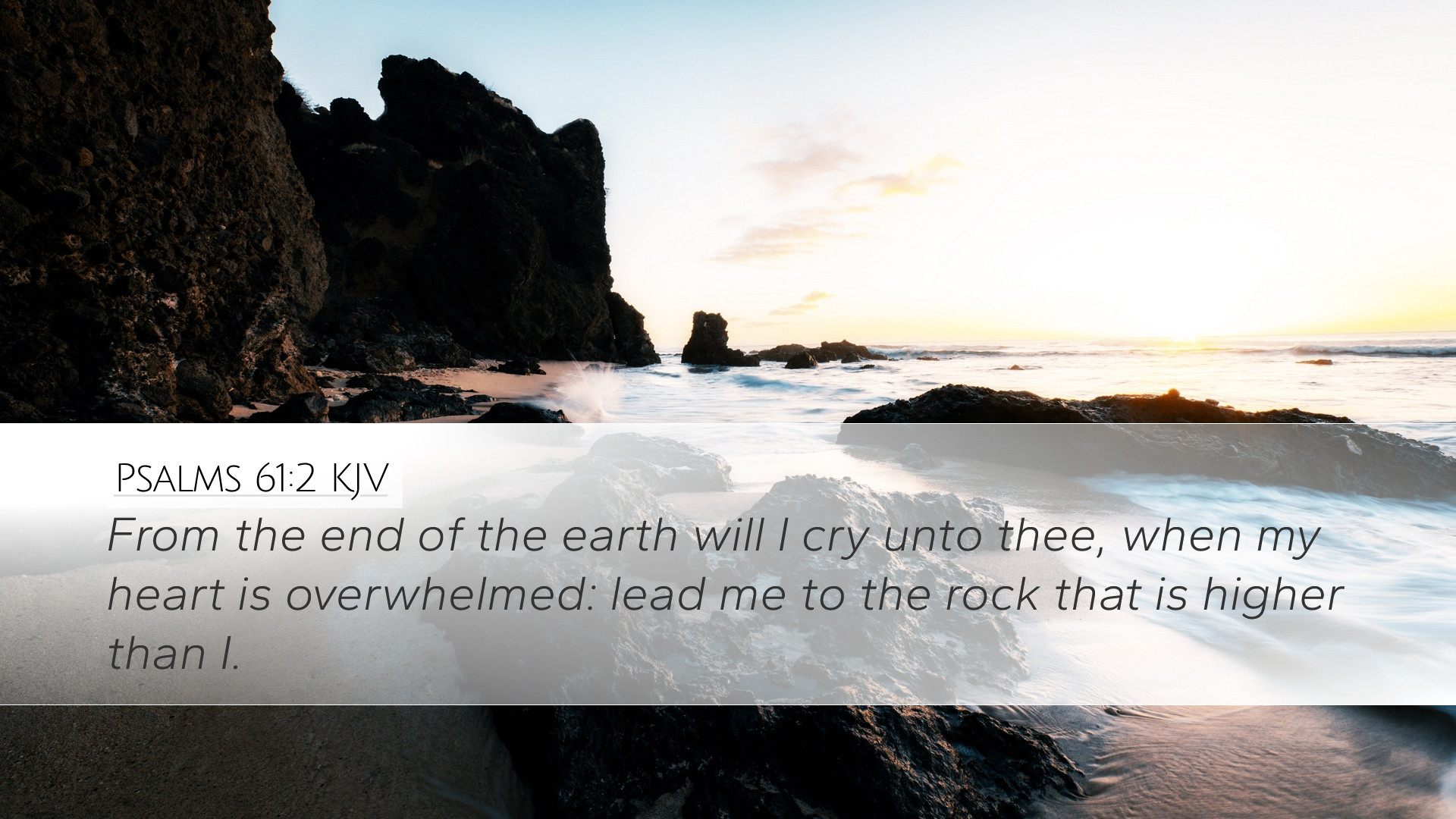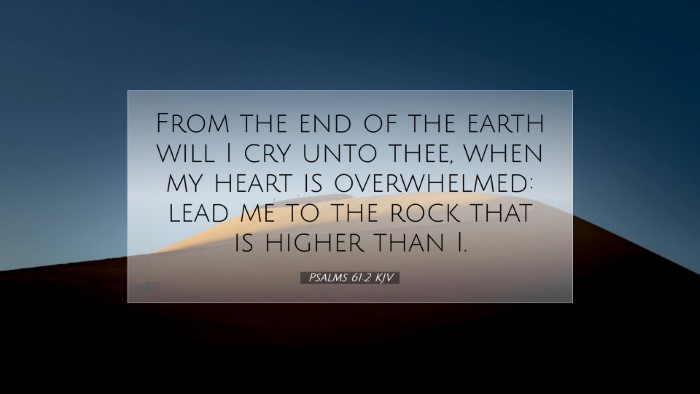Psalms 61:2: "From the end of the earth will I cry unto thee, when my heart is overwhelmed: lead me to the rock that is higher than I."
Introduction
This verse from the book of Psalms reflects deep spiritual insights and human emotions amidst distress. The psalmist expresses a profound sense of longing for divine assistance and refuge during overwhelming circumstances. This commentary synthesizes insights from notable public domain commentators to unveil the meaning and implications of this verse for contemporary readers, particularly pastors, students, theologians, and Bible scholars.
The Call to God
The opening phrase, "From the end of the earth will I cry unto thee", is significant. It indicates the psalmist's feeling of distance—both physical and spiritual—from God. Matthew Henry notes that this cry suggests a literal or metaphorical distance, emphasizing the sinner’s position when removed from divine favor. The plea represents not only desperation but also the hope inherent in seeking divine intervention.
Albert Barnes further elaborates that this cry is sincere and earnest. It emphasizes the need for direct communication with God, underscoring that irrespective of one's circumstances, God is approachable and can be invoked with heartfelt supplication.
The Nature of Overwhelmed Hearts
The term "when my heart is overwhelmed" speaks to the human condition. The psalmist articulates a relatable struggle that many face at various life stages. Adam Clarke interprets this moment of overwhelm as a natural and common human experience, suggesting it refers to anxiety, grief, or fear that weighs down the soul. Such emotional burdens prompt a genuine return to God for solace and support.
This phrase also implies recognition of human limitations. The psalmist understands that there are moments when one's own strength and wisdom are inadequate to navigate through turmoil. This recognition is a stepping stone towards embracing reliance on God.
Desire for Divine Guidance
The plea "lead me to the rock that is higher than I" is particularly poignant. Indeed, a desirable metaphor carries substantial theological weight. The "rock" reflects stability, strength, and a place of refuge. Henry points out that in times of distress, we ought to seek a foundation that surpasses our own capabilities and recognizes that God alone is this elevated rock. This plea is both a acknowledgment of God's superiority and a recognition of the psalmist’s own vulnerability.
Barnes explains that the "rock" can be understood as a symbol of Christ, who serves as the ultimate refuge for believers. This aligns with the New Testament understanding of Christ as the cornerstone of faith — offering safety from the perils of the world and eternal security.
Theological Implications
Overall, Psalms 61:2 compacts a powerful theological stance on distress, the nature of human emotion, and divine availability. Clarke emphasizes that while the earth may feel overwhelming, God's presence is not diminished—He is always accessible to those who call upon Him.
Moreover, this verse challenges readers to consider their own heart conditions, urging self-reflection when overwhelmed. It points to the profound truth that in the depths of despair, turning towards God can lead to illumination and guidance. This divine guidance can manifest through scripture, prayer, or the support of a faith community.
Practical Applications
- Encouragement in Personal Prayer: Pastors and leaders can use this verse to encourage congregants to bring their burdens to God, fostering a culture of prayer and reliance on divine providence.
- Teaching Resilience: For students and scholars, this passage exemplifies a biblical model of resilience. Understanding that feelings of overwhelm are common can help individuals better navigate their personal and communal challenges.
- Contextualizing Suffering: Theologically, this verse can be a launchpad to discuss the nature of suffering and the human condition, enriching Bible studies with related themes from both Old and New Testament texts.
Conclusion
Psalms 61:2 serves as a source of comfort and conviction, illustrating the necessity of seeking God's assistance in times of overwhelming distress. It encapsulates key theological principles regarding human frailty, divine refuge, and the call to prayer. By harmonizing insights from classic commentaries, this writing aims to enrich the understanding of this verse for all who seek deeper engagement with scripture.


